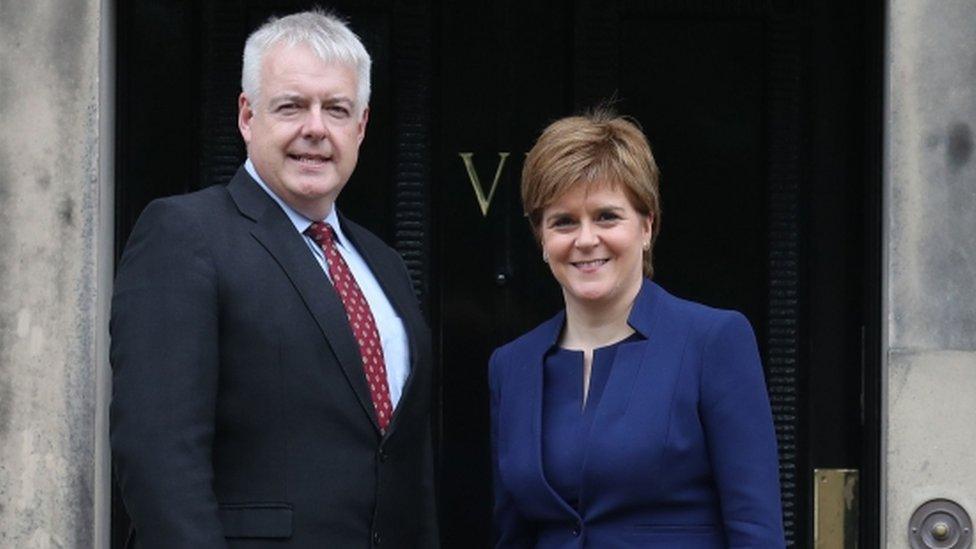Scottish Labour and Lib Dems reject Brexit powers offer
- Published
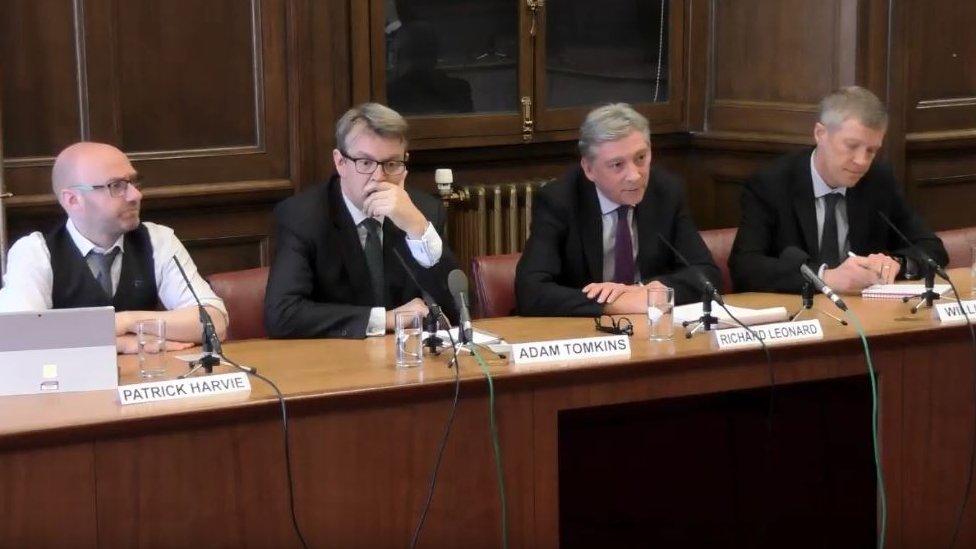
Key members of each of Holyrood's parties gave evidence to the Westminster constitution committee
The leaders of Scottish Labour and the Lib Dems have positioned themselves against the Brexit powers deal offered to Holyrood by UK ministers.
The UK and Scottish governments are struggling to resolve a row over where powers should be held after March 2019.
Scottish ministers rejected the deal currently on the table, saying it would undermine the principle of devolution.
Richard Leonard and Willie Rennie told a committee of MPs that they also would not back the proposals as they stand.
This leaves only the Scottish Conservatives in favour of the current deal - with Tory MSP Adam Tomkins saying the existing devolution settlement was "exactly the basis" of what has been offered.
The dispute centres on what will happen to devolved powers which are currently exercised from Brussels after the UK leaves the EU in 2019.
Ministers agree that some powers should be tied into UK-wide sets of rules and regulations, but differ on who should have the final say over these frameworks.
UK ministers recently tabled a fresh proposal, in the form of amendments to Clause 11 of the EU Withdrawal Bill, a key piece of Brexit legislation at Westminster. This deal was accepted by the Welsh government, but rejected by the Scottish one.
They say there is a "key sticking point" over whether Holyrood's explicit consent is sought before devolved powers are used through joint frameworks, which UK ministers arguing that Westminster should have the final say if talks were to become deadlocked.
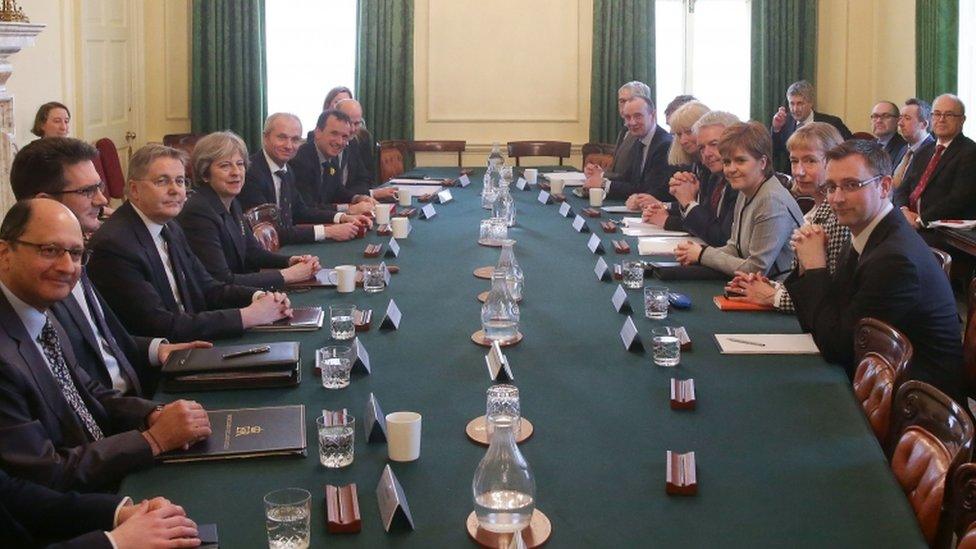
There have been many meetings, but the UK and devolved governments remain some distance apart
At a meeting of the Commons committee on public administration and constitutional affairs committee in Edinburgh, Mr Leonard and Mr Rennie both said the current offer from UK ministers - which includes a time limit on how long the powers would be held at Westminster - was not good enough.
Labour leader Mr Leonard said there were "aspects of it which need to be addressed".
He said there had been a "complete breakdown of trust" between the governments, saying: "I agree that there has been a degree of movement which has provided for people to now think about reaching a settlement.
"But I take the point that the definition of consent is problematic, and I think there are still knots in the bill as it stands that need to be untied."
Mr Rennie meanwhile said a different way of resolving disputes between governments was needed.
He said: "We need to create a level playing field across the UK for the Withdrawal Bill. Westminster having the final say isn't sufficient.
"There needs to be some kind of mechanism, perhaps around qualified majority voting of some sort."
Green co-convener Patrick Harvie said common frameworks were "entirely achievable without an extra restriction on the legislative ability and freedom of the Scottish parliament".
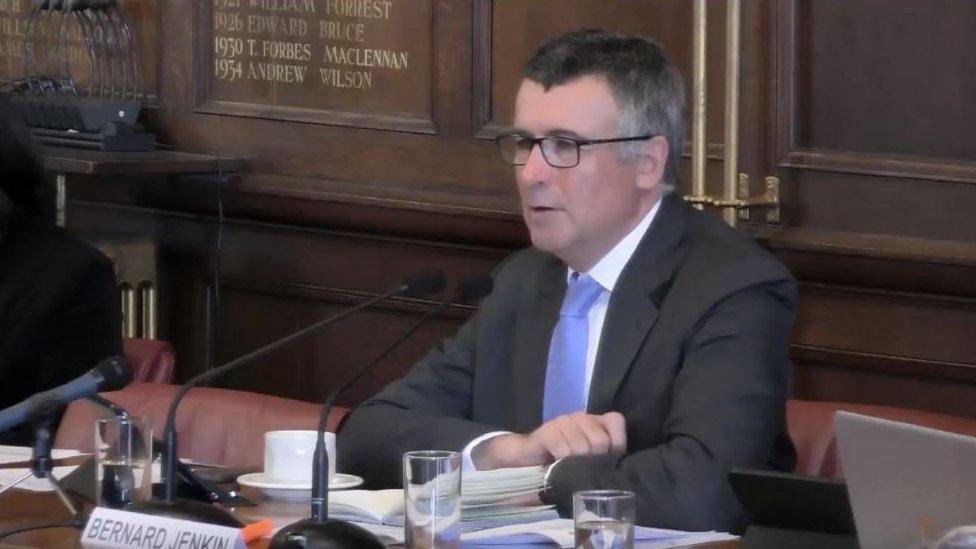
Tory MP Bernard Jenkin chaired the committee meeting in Edinburgh
Under the current system, Holyrood can give its consent to Westminster legislation in line with what is known as the "Sewel Convention" - which states that the UK parliament "will not normally legislate with regard to devolved matters without the consent of the Scottish parliament".
Committee chairman Bernard Jenkin said a model like that sought by Scottish ministers would mean "instead of the Sewel convention saying 'normally', it would say 'never'".
Mr Tomkins agreed, saying Scottish ministers were effectively seeking a "veto" over the UK use of powers, an advance on the current devolution settlement.
The Conservative MSP said the amendments put down by UK ministers "essentially copy and paste Sewel", saying it was "disappointing" that Scottish ministers wanted more.
He said: "That rule that parliament will not normally legislate on devolved matters without our consent as MSPs is exactly the basis of the amendment which was published last week. That powers will not normally be taken into the holding pattern under the revised Clause 11 without the consent of the Scottish parliament.
"Searching for a power that is greater than that, which goes from 'normally' to 'never', is to move from the spirit of devolution, which is intergovernmental cooperation, to something which is quite different, which is giving devolved administrations vetoes on powers."
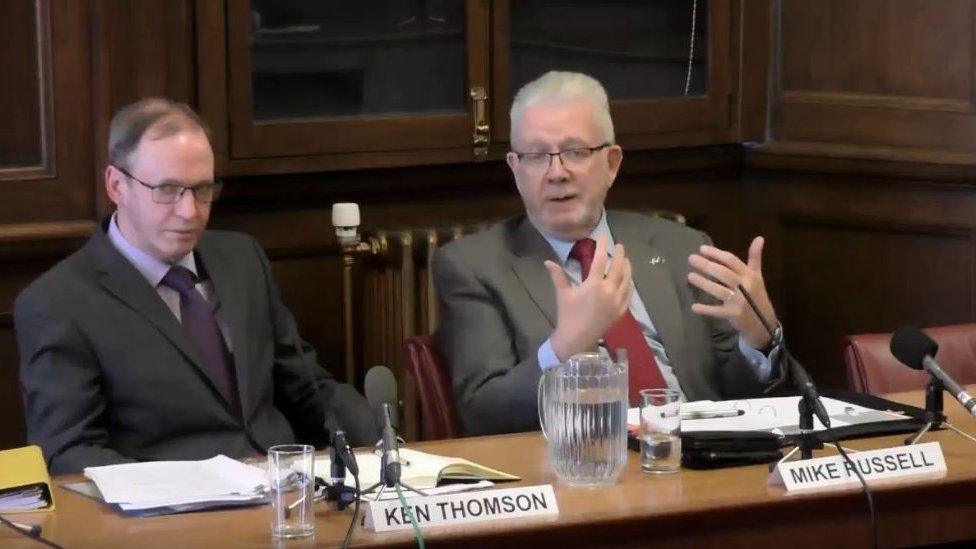
Mike Russell said there was a "substantial lack of trust on both sides" of the row
In a subsequent session, Scottish Brexit minister Mike Russell told the committee that he did not like the fact that UK ministers already had the power to overrule Holyrood, but said the current deal would add
He said: "There is already a power that exists within the Scotland Act to tell the Scottish government to do something.
"I can't pretend I like that, but I acknowledge that it exists, and is part of the devolution settlement. And until the devolution settlement changes, that won't change.
"What is I believe in Clause 11 being attempted is another backstop power being added to that backstop power, so that there is another way of ensuring that the Scottish government doesn't do something, that's what we object to.
"I'm not in any sense trying to overturn the existing constitutional settlement. That might be something I'd like to see happen, but it's not what we're doing in the negotiations.
"What we're trying to do is ensure we deliver something that's workable. I would hope sense, negotiation and trust will produce circumstances in which there is an agreement."
Mr Russell also told the committee that trust between the Scottish and UK government was "at the lowest ebb I've experienced".
He said UK officials had only shared the draft of the Withdrawal Bill with Scottish counterparts two weeks before the bill was published - as opposed to the months usually given for consideration of a bill which may need devolved consent. Scottish ministers then only shared their own Brexit legislation with the UK government the day before it was published.
He said there was a "substantial lack of trust on both sides", saying that ministers "did not trust the processes" for intergovernmental relations.
- Published29 April 2018
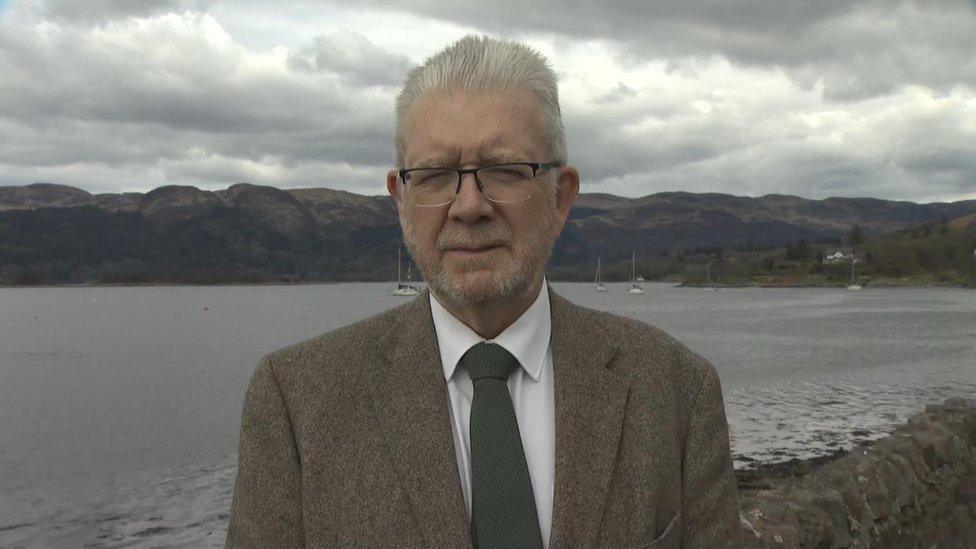
- Published24 April 2018
